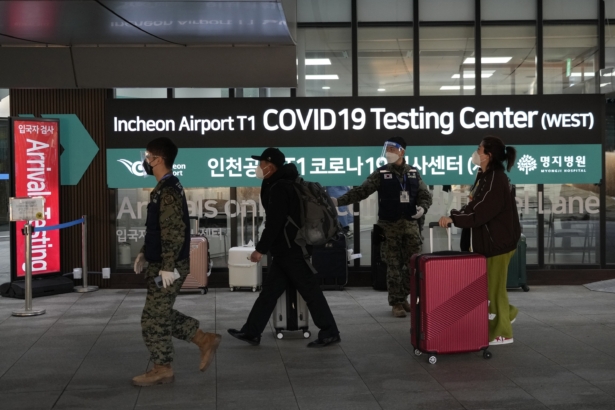BEIJING—Chinese embassies suspended issuing new visas for South Koreans and Japanese on Tuesday in apparent retaliation for COVID-19 testing requirements recently imposed by those countries on travelers from China.
The embassies in Tokyo and Seoul announced the suspensions in brief online notices.
The Seoul notice, posted on the embassy’s WeChat social media account, said the ban would continue until South Korea lifts its “discriminatory entry measures” against China. The announcement covered tourist, business, and some other visas.
China’s Foreign Ministry threatened countermeasures last week against countries that had announced new virus testing requirements for travelers from China. At least 10 in Europe, North America, and Asia have done so recently, with officials expressing concern about a lack of information about rapidly spreading virus outbreaks in China.
It wasn’t clear why South Korea and Japan were targeted and whether the suspensions would be expanded to other countries that have imposed virus testing on passengers from China.
China’s embassy in Tokyo said only that visa issuance had been suspended. The announcements appeared to apply only to new applicants, with nothing about people currently holding visas.
South Korea’s Foreign Ministry said in a statement that “our government’s step to strengthen anti-virus measures on passengers arriving from China is based on scientific and objective evidence. We have provided information to the international community in a transparent manner, and we have communicated with the Chinese side in advance.”
Foreign Minister Park Jin. Qin said he “hopes that the South Korean side will uphold an objective and scientific attitude.”
About a dozen countries have followed the U.S. in requiring either a negative test before departing China, a virus test on arrival at the airport, or both.

“Regrettably, a handful of countries, in disregard of science and facts and the reality at home, have insisted on taking discriminatory entry restriction measures targeting China,” Chinese Foreign Ministry spokesperson Wang Wenbin said Tuesday. “China firmly rejected this and took reciprocal measures.”
He did not respond directly when asked if new visas had been suspended for South Koreans and Japanese, saying only that he had “made it very clear.”
The World Health Organization and several nations have accused China of withholding data on its outbreak.
Once-cordial ties between South Korea and China, its biggest trading partner, soured after Beijing targeted businesses, sports teams, and even K-pop groups to protest the deployment of an advanced U.S. anti-missile system in South Korea.
China fought on the side of North Korea in the 1950–1953 war and has remained a supporter of the North despite its missile launches and nuclear tests, and has opposed further sanctions against Kim Jong Un’s government.
China abruptly reversed its strict pandemic containment requirements last month. That came after three years of lockdowns, quarantines, and mass testing that prompted rare politically tinged protests in the streets in Beijing and other major cities.
China is now facing a surge in cases and hospitalizations in major cities and is bracing for a further spread into less developed areas with the start of the Lunar New Year travel rush, set to accelerate in the coming days. While international flights are still reduced, authorities say they expect domestic rail and air journeys will double over the same period last year.
